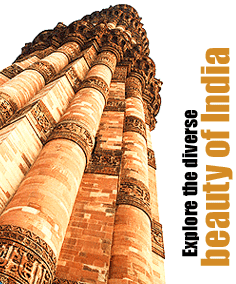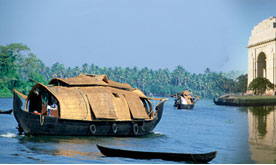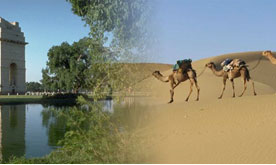|
 |
| Temples of India in styles varying from simple to most extravagant with detailed work of art reflect grandeur and spiritual character of its inhabitants.
|
|
|
| |
 |
|
|
|
 |
 |
|
Travel Tips
Travel Tips / Travel Advice
Time
Time difference: UTC+5.5 (10.5 hours ahead of Washington, DC during Standard Time)
Climate
A lot of variety in climate for the whole year. India has hot, dry summers, with June being the hottest month of the year. In the north the winters are very cold as compared to south where winters are mild. The weather of India has a significant impact of long Himalayan Mountains, as you can experience very different weather going from town to town. Some regions of India experience rainfall for the whole summer season.
Official Language
English enjoys associate status but is the most important language for national, political, and commercial communication; Hindi is the most widely spoken language and primary tongue of 41% of the people; there are 14 other official languages: Bengali, Telugu, Marathi, Tamil, Urdu, Gujarati, Malayalam, Kannada, Oriya, Punjabi, Assamese, Kashmiri, Sindhi, and Sanskrit; Hindustani is a popular variant of Hindi/Urdu spoken widely throughout northern India but is not an official language (2001 census)
Religion
Hindu 80.5%, Muslim 13.4%, Christian 2.3%, Sikh 1.9%, other 1.8%, unspecified 0.1% (2001 census)
Communications
Telephones and mobile cellular services are available in every part of the country. Internet Service Providers (ISPs) provide easy access to Internet users. There are numerous Internet cafes in India. The international access code for India is +91, and the outgoing code is 0, followed by the relevant country code. City/area codes are not necessary.
Passport
While travelling to India you need to have some basic travel documents for identification and permission to enter the country. These important documents for travelling in India are equally necessary. Your passport is the most important document for your travel across the continent. Your passport has to be a valid one and you must keep the attested Photostat copies with you and the originals in some safe place. You need to have a passport that is valid for at least six months from date of departure.
Visa (Indian Visa)
- A person visiting India has to have a visa. It is like an entry card to the place you are visiting. Persons found without a visa are not permitted to enter India and are detained and sent back. For more visa related queries & information you can visit the local Indian embassy in your Country.
- Go through these Indian visa guidelines to get a general idea about getting a visa for you for travelling to India.
- The visa is usually valid for six months, though it may also depend on the rules of your resident country.
- You may apply for a collective visa if you are travelling in a group of not less than 4 people and are being dealt by a recognized travel agency.
- The visa fees are usually non-refundable and may change without prior notice. Contact your embassy for further details.
Types of Visas
- Tourist Visa - In case you are touring India.
- Student Visa - Given to students who are coming to India for studies.
- Employment Visa - Given to professionals who come for work in India.
- Transit Visa - For passengers who have to go through India to some other destination.
- Missionary Visa - For those travellers who want to visit India as missionaries.
- Business Visa - Issued to those who have come to India on business purpose.
|
|
|

